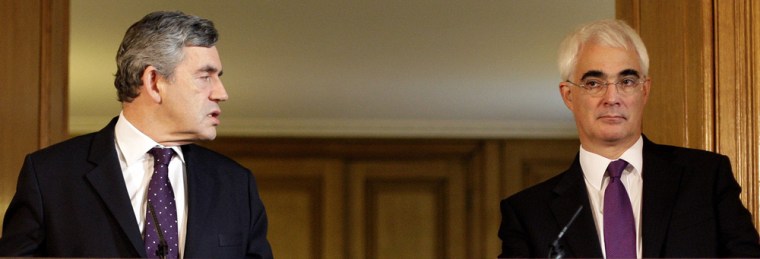During the go-go years of the late 1990s and early 2000s, Britain found itself at the center of the world’s economy. Conventional wisdom had it that The City — London's financial district — had surpassed Wall Street as the global money center.
So it is not surprising that as the financial crisis went global, Prime Minister Gordon Brown swiftly jumped into the fray. The former U.K. Treasury chief announced a bold government plan, which the Bush administration ultimately mirrored, to partially nationalize some of the country’s top banks — Lloyds TSB, HBOS and Royal Bank of Scotland.
But as the once-beleaguered Brown’s standing skyrocketed overnight to a world-saving figure of Churchillian proportions, questions surged about what these moves mean for Britain and whether the country was turning its back on the open markets nurtured initially by Conservative governments and then by Brown’s predecessor, Tony Blair.
For some observers, the crisis raised pointed questions about whether Brown's Labour Party would pursue “common ownership of the means of production,” as its constitution once espoused. That was an ideology the party later ditched as Labour rebranded itself as business-friendly "New Labor" during the Blair years.
Whether or not there has been a deep shift in thinking, the country is getting set for an almighty hangover after more than a decade of ballooning house prices and easy credit.
Britons are deeply indebted. Average household debt stands at more than $100,000, according to charity Credit Action. These are big numbers with significant consequences — 275 people are declared insolvent every day, equaling one insolvency every 4.8 minutes, the charity says.
Jitters
The souring economy makes many nervous.
Take Helen Mabberley, a 30-year-old who has to refinance the mortgage on the one-bedroom apartment she bought four years ago. She estimates that when all is said in done, she will end up paying a whopping 200 pounds ($323) more a month on her mortgage.
Like so many others, she feels like the situation is out of her control.
“I literally don’t understand what’s going on,” she said.
You can multiply Mabberley’s fear by many millions.
But consumers and the government should not let themselves off the hook, said Martin Weale, director of the National Institute of Economic and Social Research.
“Why aren’t people angry at themselves?” Weale said. “Why wasn’t there pressure on government to take measures to limit the housing speculation? Voters were living in a fools’ paradise.”
While Weale said the current government was irresponsible, he didn’t feel its actions in the wake of the crisis would be a departure from the past, or be too different from those of Thatcher’s Conservative Party.
“In economic terms, both parties will be offering the same sort of things as each other,” he said, largely in terms of greater regulation.
Still, government involvement of any kind tends to make businessmen shudder. Partly due to that, one leading bank turned down state funding.
“Those who have government shareholdings will be more constrained in their strategic and operational flexibility than those who are independent,” John Varley, CEO of Barclays, told reporters.
In other words, Varley was suggesting, businesses that have the government breathing down their necks will suffer in competitive terms compared to those that have greater flexibility.
And there was also the issue of attracting the best talent.
“There will be some people in the employment market in the United Kingdom who will make the judgement that they don’t want to work for an organization that is controlled by government,” he said.
But although the government has embarked on a campaign of creeping nationalization, Britain is not necessarily heading back to the days of state involvement.

Alistair Darling, Britain's Treasury chief, said the government was not interested in getting too involved on the business side of things at bailed-out banks.
“These shareholdings will be managed on a fully commercial basis by an arm’s-length body — with a precisely defined remit — to act in the interests of taxpayers,” he told Parliament when the package was unveiled.
“The long-term future of U.K. banks lies in the private sector. We will aim to sell the public share in the participating banks as soon as feasibly possible,” Darling said.
So, the government will hold the banks’ management at arm’s length. Stakes will be sold as soon as possible. Bankers will still get their bonuses.
As former Labour Cabinet minister Patricia Hewitt said: “I think full-blooded socialists who might well be saying ‘Well, if we can nationalize the banks, we can nationalize some other things,’ are going to be gravely disappointed.”